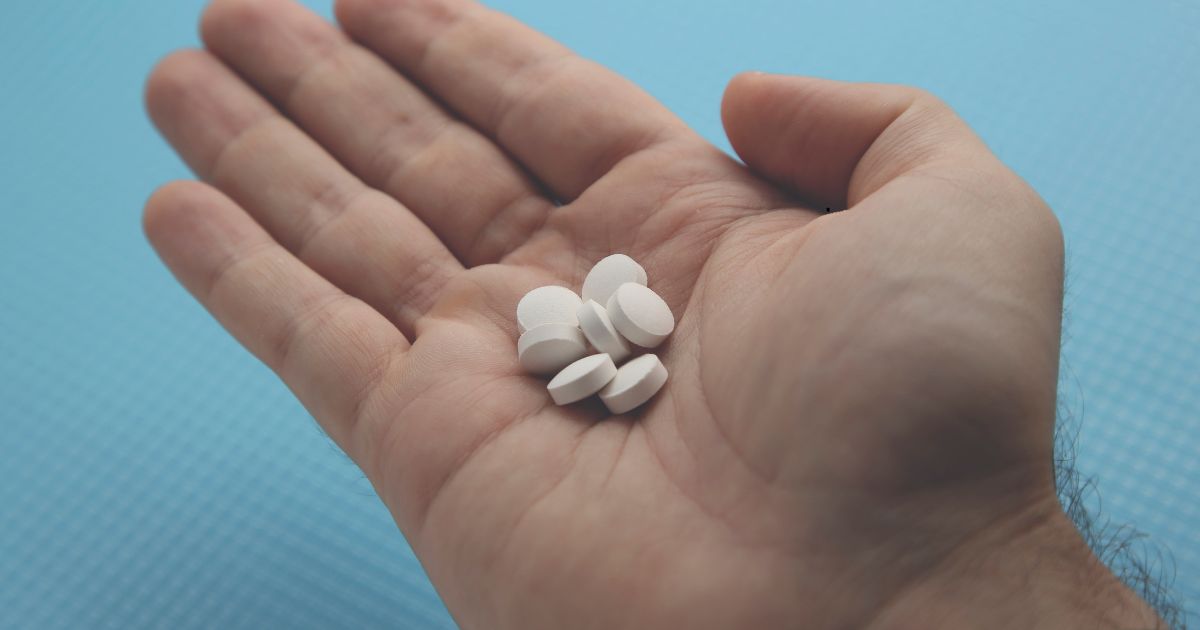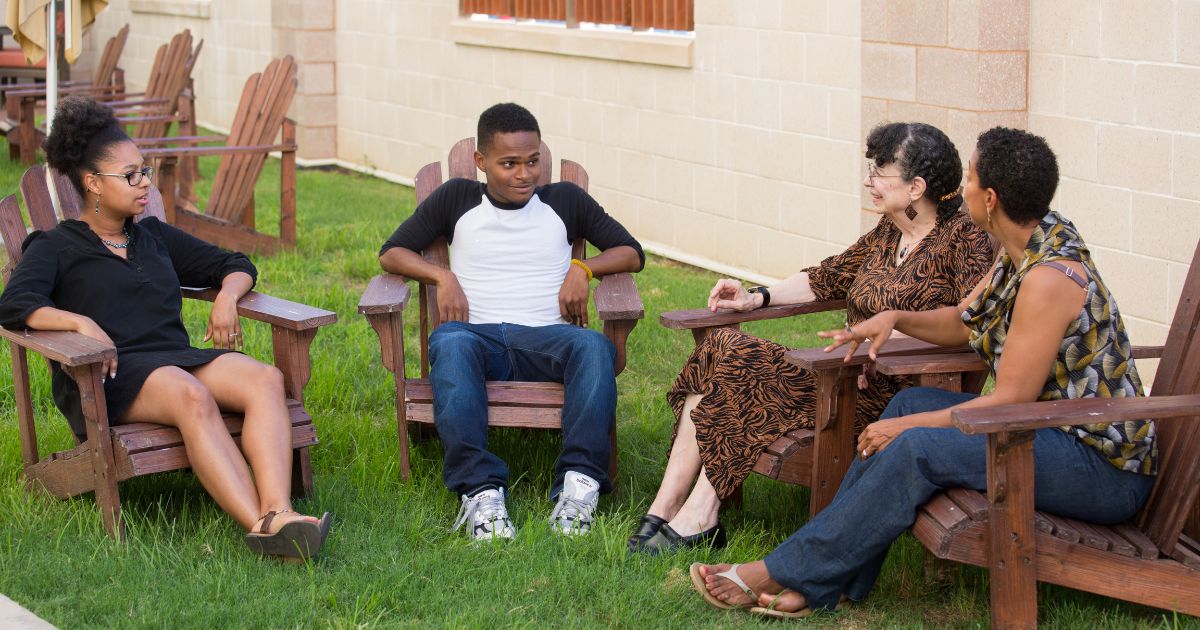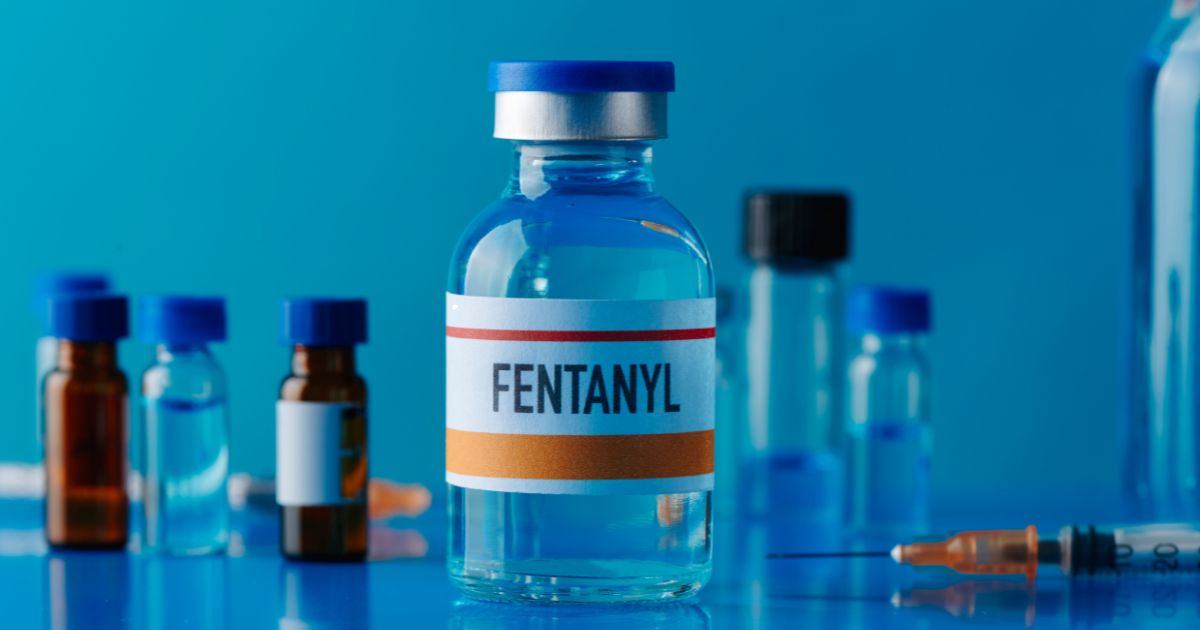Taking care of yourself during the pandemic is critical to your physical and mental health—especially for people in recovery. Most of the world is still learning how to handle the pandemic that’s been a part of life since 2020. By now, one thing is clear—you are either your greatest ally or your own worst enemy at such times.
How you react to the pandemic makes all the difference. In order to take care of yourself during the pandemic, it is important to maintain healthy habits and keep yourself accountable.
With some of the media touting holistic remedies and shiny new products to keep your immune system pristine, it can be pretty confusing. That said, if you’re looking for some simple solutions for taking good care of yourself during the pandemic, you’ve come to the right place.
Is the Covid-19 Pandemic a Big Deal?
Some people researched their way through the entire internet to prepare for the pandemic. Others purchased books covering the history of pandemics from A-Z. You may have a loved one who made it their mission to advise everyone on the best at-home remedies and the power of B-12 vitamins to prevent you from falling ill.
On the other hand, maybe your friends insist that ignorance is the best policy when dealing with the pandemic. Some people claim that the coronavirus is being over-hyped and there’s no point in buying supplies they’ll never end up using.
Once things continued to get worse overseas and at home, the reality of a global pandemic started to set in. As countries began closing their borders and imposing travel bans, fears of catching the virus spread throughout communities. How to take care of yourself during the pandemic suddenly became a huge topic of conversation.
Take Care of Yourself With Basic Safety Tips for Covid-19
Having recommended resources on hand can help ease anxiety, which can be a trigger for people in recovery.
The recommendations for a basic emergency supply kit include:
- Water
- Non-perishable food
- Manual can opener
- Paper towels, mess kits, cups, plates, and utensils
- Paper and pencil
- Cash or traveler’s checks
- Local maps
- Important documents in a waterproof container
- Matches in a waterproof container
- Cell phone
- Phone charger
- Rechargeable/backup battery
- Battery-powered radio
- Flashlight
- Extra batteries
- First aid kit
- Personal hygiene items
- Toilet paper
- Whistle
- Dust mask
- Plastic sheeting
- Duct tape
- Moist towelettes
- Garbage bags
- Plastic ties
- Wrench/pliers
- Fire extinguisher
- Sleeping bag
- Warm blanket
- Complete change of clothes
- Books, games, puzzles
- Prescription medications
- Eyeglasses/contacts
- Infant supplies
- Pet supplies
- Feminine supplies
Items that help prevent the spread of coronavirus or other illnesses include:
- Masks
- Soap
- Hand sanitizer
- Disinfecting wipes
- Gloves
- Face shield
- Cough drops
- Fever reducing medications
Whether you’re already a nervous wreck or determined not to panic, be mindful of the major media outlets. While staying informed can keep you safe, it can also leave you trapped in a cycle of chaos.
Instead of getting lost in a media frenzy, try participating in a soothing activity like a jigsaw puzzle or reading a good book.
While the world is in the midst of a crisis, the best way to avoid a crisis of your own is by taking care of yourself during the pandemic.
Take Care of Yourself With a Covid-19 Self-care Checklist
During the pandemic, it can be difficult to clear your mind and carve a path forward for yourself. While it may be easier to binge-shop toilet paper and scroll through social media, it’s important to practice healthy habits—and implement new ones—to prevent relapse and maintain your happiness, health, and sobriety.
Instead, implementing self-care activities can help you take care of yourself during the pandemic. Covid-19 self-care checklists can include more than just face masks and bubble baths. When practicing self-care, you make a conscious decision to tend to your mental, emotional, and physical needs so that you can maintain your overall well-being.
Ways to take care of your mental and emotional health:
- Have routine self-check-ins
- Seek out virtual support
- Practice compassion
- Limit your media consumption
- Spend time in nature
- Feel your feelings
- Ask for help
Along with hand washing and disinfecting, it is vital to take care of yourself mentally and emotionally as well. During the Covid-19 pandemic, it can be easy to slip into old habits like self-isolation and avoidance.
It is important to practice healthy coping skills so that you can maintain your physical, mental, and spiritual health. More importantly, choosing to take care of yourself during the Covid-19 pandemic will help you maintain your sobriety.

Perform Routine Self-Check-ins
“How am I doing?” As important as this question is, it’s something people often forget to ask. When you check in with yourself, you learn things that may surprise you.
Try asking yourself what you need right now and see what comes to mind:
- Straighten your back
- Put a hand on your heart or your belly
- Close your eyes
- Check-in with yourself
Your body will tell you what it needs.
Are your eyes burning? Ask yourself if you’ve been getting enough sleep. Naps are nothing to be ashamed of. Maybe you’ve been staring at a computer screen for hours and would benefit from a walk outside.
Feeling stressed? Maybe grounding techniques and meditation can help you relax.
If you live alone, you may feel better after a FaceTime call with a friend or giving your mom a call. You can also sit down to play with your pet for a while to bring a smile to your face.
Whatever you need, do your best to honor it. Taking the time to satisfy the needs of your mind and body will definitely serve you and your recovery in the long run.

Seek Out Virtual Support
While the idea of virtual meetings may seem cold and distant to some, the idea has caught on during the pandemic, and for good reason. Following statewide lockdowns, sober people turned to FaceTime, Zoom, and Google Meet in order to spend time with members of their support systems.
Virtual support meetings can include:
- Participate in online AA and NA meetings
- Weekly calls to vent and catch up with your friends and family
- Start a sober book club to absorb and discuss recovery literature
- Set up virtual Netflix watch parties to share laughter with others
- Throw routine dinner parties to limit your alone time in isolation
- Hold a game night for an emotional pick-me-up and to destress
- Workout with your gym pals in a virtual exercise class to get those endorphins going
Virtual gatherings are a great way to stay in touch with faraway relatives. In fact, with the advances in technology and the sudden need for virtual meetings, a lot of families are ‘seeing’ each other more than ever before.
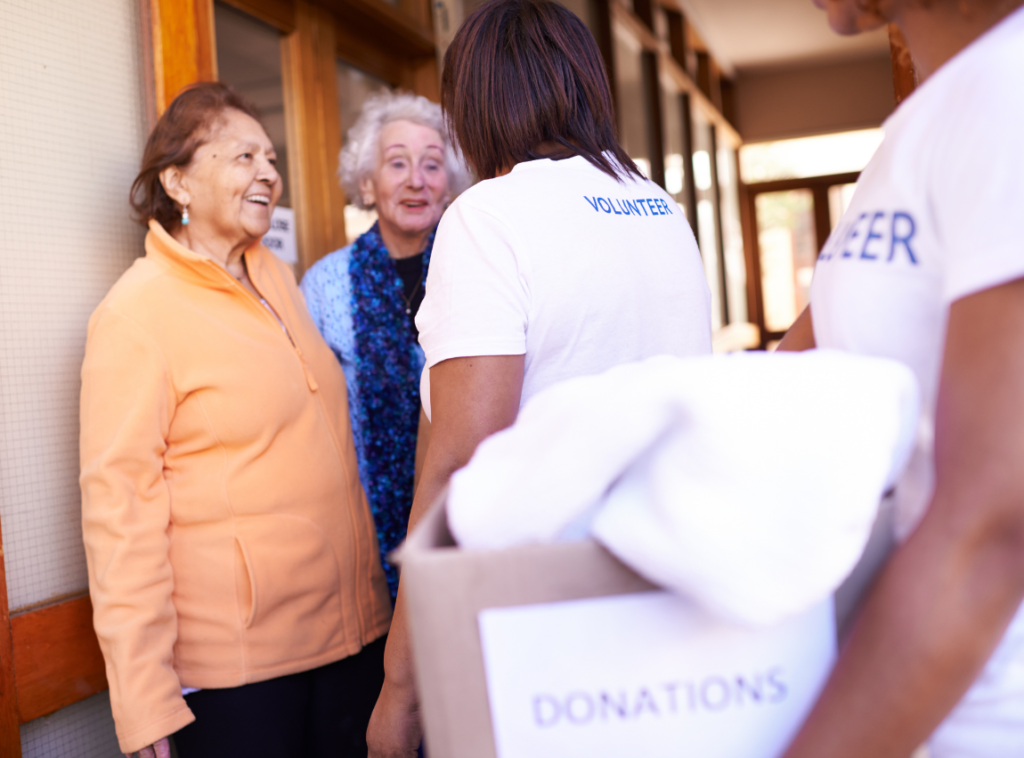
Take Care of Yourself and Others by Practicing Compassion
Most of us have seen the impacts of tension and stress caused by pandemic lockdowns and mask mandates. Although safety restrictions were imposed in an effort to keep people safe, the indefinite lockdowns and ever-looming fear of illness raised 21st-century American stress levels to an all-time high.
It has never been more important to practice loving-kindness towards yourself and others. Everyone is doing their best to navigate the fallout of the Covid-19 pandemic, even if it doesn’t look like it.
If you ever find yourself taking the blame for miscommunication at work or in a friendship, remember to practice positive self-talk. Giving yourself and the people around you the benefit of the doubt and a much-needed break will do wonders in improving your mental health.
Additionally, you can take care of yourself and others by helping others in your community who have been impacted by Covid-19. Volunteering for local food drives, homeless shelters, and other community involvement efforts can lower your risk of social isolation and give you a sense of purpose. For this reason, you can empower yourself knowing that you are impacting the lives of others, which strengthens your mental health and your recovery both during and after the pandemic.
Limit Your Media Consumption
Sometimes we think being “in the know” gives us a sense of control, but more often than not, it adds unnecessary stress onto our plate. In fact, a habit as innocent as checking the news can quickly devolve into an addiction to social networks like Facebook and Instagram if the behavior gets out of hand.
Especially during the pandemic, studies show that people struggling with internet addiction are more likely to develop acute-mental stress disorders and suffer from a full-blown mental health crisis.
Remember, even though the news moves quickly, you don’t need to consume media during all hours of the day. Constantly checking for updates just creates more anxiety. While the pursuit of knowledge is never something you should overlook, focusing on recovery maintenance and the management of any mental health conditions is priority number one.
If you’re not able to cut the news cycle from your schedule, try starting off small by decreasing what kinds of news outlets pop up on your phone screen. Each week, try checking the “this just in” articles less and less. Eventually, you’ll find that reading articles or watching videos once per day isn’t as impossible as it once seemed.
The same goes for those who spend their time mindlessly scrolling through digital media content on TikTok and Instagram as a form of escapism.

Spend Time in Nature
During the pandemic lockdowns, it can feel like there are eight days in a week. The best way to stave off feelings of boredom and loneliness is to go outside.
Whether you’re blessed to live in an area with beaches, mountains, gardens, or parks, taking time out of your day to appreciate nature can help you refocus your mind. Studies exploring the mental impacts of nature suggest visual images of mountains, waterfalls, and sunsets can help reduce stress and fatigue. That said, why not take care of yourself by getting a mental boost from the beautiful outdoors?
Enjoy walks, runs, and hikes without worrying about the latest headlines. Stretch your legs and get a scenery change as you stroll through the park.
Some studies even found that strolling in a park or other natural settings for just 20 minutes provides significantly more stress relief than walking on city streets.
While it’s tempting to close the blinds, turn off the lights, and spend your time off from work playing video games, it’s not good for your eyes or overall health. Choosing to venture outside as a part of your self-care routine will improve your mental and physical well-being.
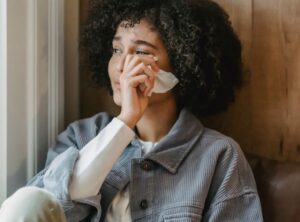
Take Care of Yourself by Feeling Your Feelings
Most agree—the pandemic is a scary situation. If you’re having a difficult time trying to “keep calm and carry on,” know that you aren’t alone.
While remaining calm in a global pandemic is important, it’s also equally necessary to avoid repressing your true feelings. Trying to shut down feelings of fear and grief with alcohol or drugs may numb your feelings temporarily, but avoidance is never a long-term solution.
During the pandemic, many people have developed poor mental health due to isolation and a disruption of their daily routines. While stress is understandable during a global pandemic, bottling up your feelings is not. For the most part, it’s healthier to have a momentary breakdown in the comfort of your support system than allow your stress to build up inside of you. After you let out your feelings, you can begin to move forward and focus on problem-solving for the future.
In recovery from addiction, it’s important to remember that your feelings are never something to be ashamed of or hide. Feeling your feelings is one of the most natural things you can do. More importantly, accepting the comfort and assistance of others will help you through moments of doubt and will help you stay sober!
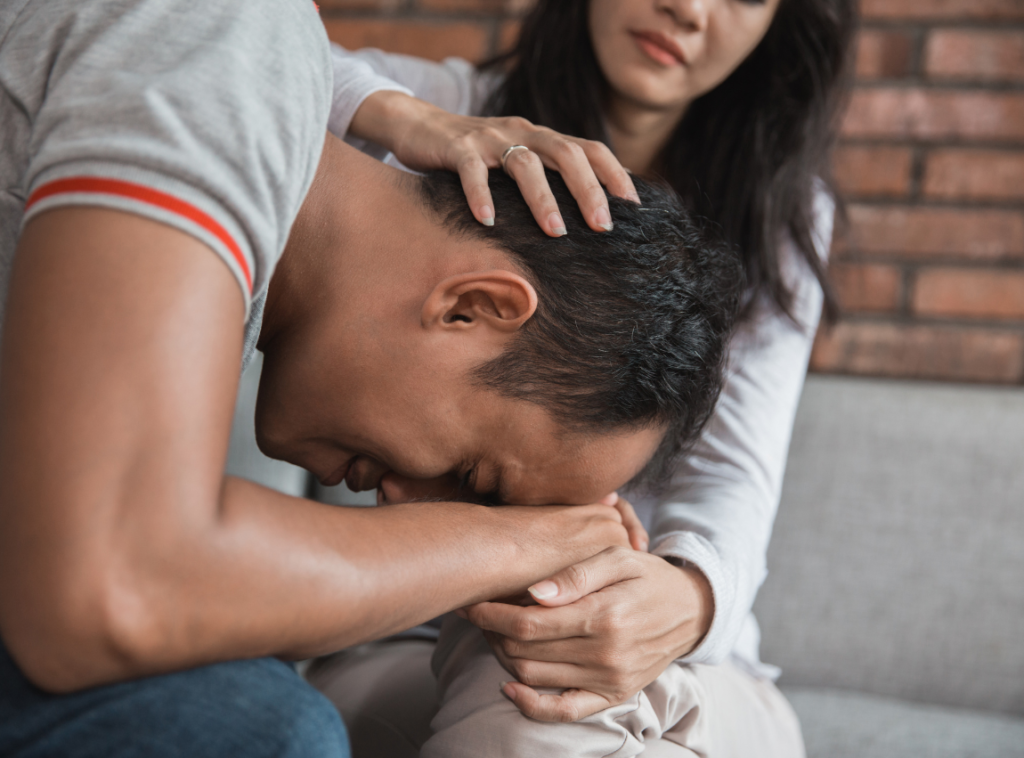
Take Care of Yourself by Asking for Help
Asking for help can feel small and personal or like a momentous feat. You may need someone to watch your kids while you go for a stress-relief jog outside. Alternatively, you may need extra support to avoid a full-blown mental crisis or relapse. Whether you need a ride to AA, or a shoulder to cry on after a hard day, the best way to get what you need is to ask.
Asking for what you need will help to serve yourself and everyone else in the long run. In order to take care of yourself during the pandemic, it is vital to allow others in and avoid any urge to self-isolate.
Moving past feelings of guilt or shame and opening up to someone in your support system can save you a lot of stress and pain. You aren’t alone—not during the pandemic or ever, so reach out to the people who love you if you need support during these difficult times.
Looking for Help?
If you are looking for substance abuse treatment options for yourself or a loved one, please reach out. We’re available 24/7, and every call is free and confidential. Reach out to us by calling 866-881-1184.
REFERENCES:
- Viewing Nature Scenes Positively Affects Recovery of Autonomic Function Following Acute-Mental Stress – NCB
- Why Is Nature Beneficial?: The Role of Connectedness to Nature
- Internet Addiction: A Brief Summary of Research and Practice – NIH
- Mental Health, Substance Use, and Suicidal Ideation During the COVID-19 Pandemic – CDC
- Symptoms of Anxiety or Depressive Disorder and Use of Mental Health Care Among Adults During the COVID-19 Pandemic – CDC
- Prevalence of Depression Symptoms in US Adults Before and During the COVID-19 PandemiC – JAMA





